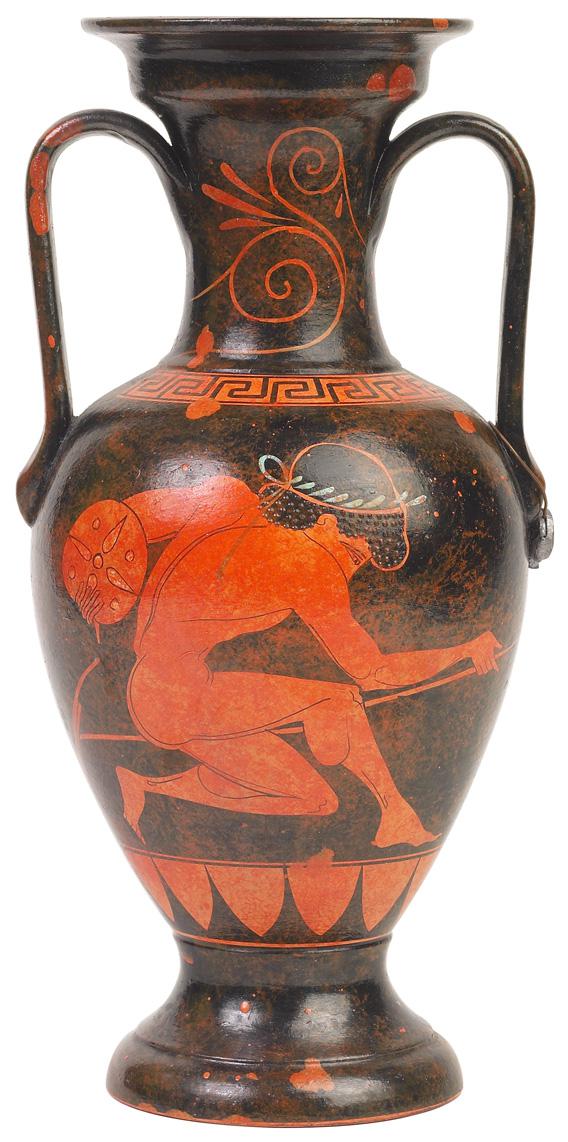The Games of the XXX Olympiad are under way in London, with China and the United States taking the early lead in the medal count. Last week, Slate visualized Olympic competitions between 19th-, 20th-, and 21st-century athletes. How would the ancient Greeks, who invented the Olympic Games, compete against today’s athletes?
Probably not well. Ancient athletes could have held their own in the first modern Olympic Games of 1896. Phayllos of Croton, for example, hurled the discus 95 feet in the Pythian games around 500 B.C. Although that distance is approximate—Greeks measured distance in actual human feet—it would have put him in the running for a medal at the 1896 Olympic competition. Phayllos probably would have bested American Robert Garrett’s 95.6-foot throw if he had used modern tools and techniques. Ancient hurlers likely used a heavier discus and took only a three-quarter turn before releasing it, rather than the two-and-a-quarter turns that modern athletes use. Variations aside, Phayllos wouldn’t have stood a chance against 21st-century athletes: The current world record is more than 243 feet.
Historians have puzzled over records from ancient long-jump competitions. Athletes posted distances of well over 50 feet—nearly double the current world long-jump record. Many classicists assume that the event was actually a triple jump, although that still puts the ancients surprisingly close to the modern record. The ancient competition was quite different from the modern version, however. The Greeks probably started from a standstill and swung handheld weights, known as halteres, to provide momentum on takeoff and allow them to extend their feet farther forward on landing.
Variations in preparation also make it difficult to compare ancient and modern Olympic prowess. Ancient Greeks trained specifically for the games for only a few months, and they may not have practiced individual events much during that time. The philosopher and physician Galen recommended playing catch, sometimes while riding on the shoulders of a fellow athlete. Weightlifting was rare because the trainers worried about overdeveloping certain muscles and creating an imbalance in strength. Athletes experimented with a wide variety of diets, including meat-, cheese-, and fig-heavy regimens. Bizarre elixirs were common, and most athletes seem to have used “cursing tablets” to hex their opponents before the games commenced. One aspect of training hasn’t changed: The ancients fiercely debated the value of sexual abstinence during the days before competition.
Ancient Olympians were also probably exhausted at the start of the games because they had to walk 36 miles just to get from Elis, the city that administered the games, to Olympia. The Greeks would have scoffed at modern athletes’ hand-wringing about fatiguing themselves in the opening ceremony.
For all their scientific training and dietary preparation, modern athletes wouldn’t want to compete directly with the ancients, who were not above cheating. Men gifted with boyish looks lied their way into the youth competitions. Although finger-breaking was illegal, a wrestler became known as “Finger Man” for his habit of crushing his opponents’ digits at the beginning of each fight. Deaths were not uncommon. One pugilist had his victory overturned because the manner in which he beat his opponent to death was too savage for even the ancients.
Got a question about today’s news? Ask the Explainer.
Explainer thanks Robert B. Kebric of the University of Louisville, author of Greek People; David Gilman Romano of the University of Pennsylvania, author of Athletics and Mathematics in Archaic Corinth: The Origins of the Greek Stadion; and Judith Swaddling of the British Museum, author of The Ancient Olympic Games.
